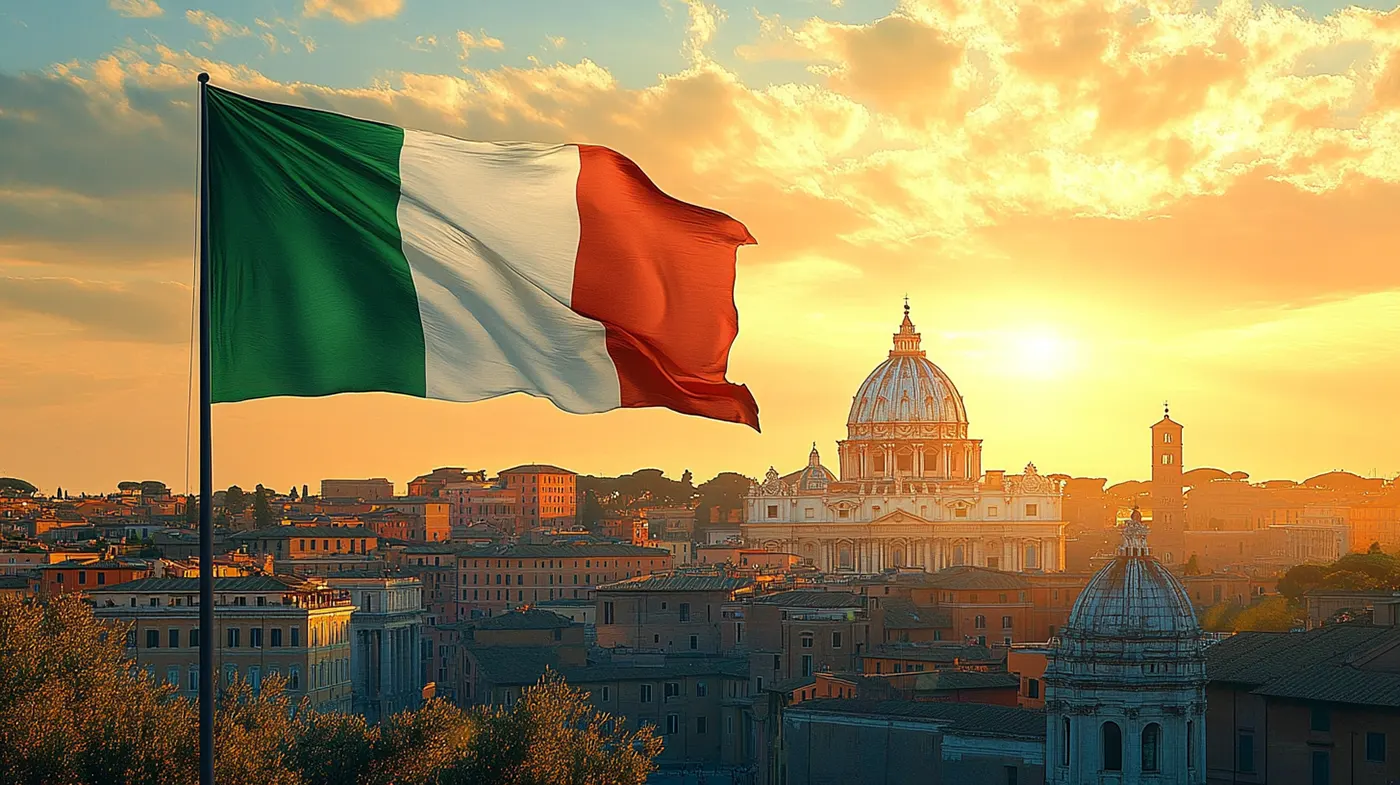Are you thinking of moving to Italy from the UK?
The idea of swapping UK drizzle for Italian sunshine continues to tempt many British families, retirees, and digital nomads alike.
Whether you dream of sipping espresso in a cobbled piazza, enjoying views of the Amalfi Coast, or settling down in the peaceful countryside of Tuscany, Italy offers a remarkable quality of life.
The lifestyle is slower-paced, food is a national treasure, and family is at the heart of everything. Add in a rich cultural heritage and world-class art, and you have an incredibly rewarding place to call home.
Of course, any international move requires careful planning.
From securing the correct visa to transporting your household goods, there’s plenty to consider before booking that one-way flight.
That’s where Barnes of Lincoln comes in. We make moving to Italy from the UK straightforward, stress-free, and professionally managed from door to door.
Why Choose Barnes of Lincoln for Your Italian Relocation?

Because relocating abroad is such a big step, you need a removal company that handles logistics.
Barnes of Lincoln has decades of experience in international removals and offers individually tailored support for anyone moving from the UK to Italy.
We specialise in both full and part-load services, so whether you are moving a whole house or just a few cherished items, we’ve got you covered.
Our team handles everything from export packing to customs paperwork. We can arrange secure storage in the UK and Italy and will ensure your belongings arrive safely and on time.
You will receive a dedicated move coordinator who will guide you through every stage of your journey.
With Barnes of Lincoln, you don’t just get a removal service, you get peace of mind.
We proudly deliver friendly, expert care backed by years of experience and 5-star customer satisfaction.
Visa and Residency Requirements for UK Citizens

Since Brexit, UK nationals have no longer been entitled to live and work freely in Italy without documentation.
If you plan to stay in Italy for over 90 days in any 180-day period, you will need a visa and a residency permit.
The type of visa you need depends on your purpose: common options include the elective residency visa (ideal for retirees with passive income), work visa, or self-employment visa for freelancers and entrepreneurs.
Once in Italy, you must apply for a “permesso di soggiorno” (residence permit) within eight days of arrival.
This is issued by your local police station (Questura).
You will also need to register your residency with the town hall (comune).
Visit the Italian Ministry of Foreign Affairs official site for up-to-date information and visa applications.
The process can seem daunting, but it is entirely possible with preparation and thorough research.
The UK Government’s guidance for Living in Italy is a helpful source of information, including applying for visas.
How Much Does It Cost to Live in Italy?
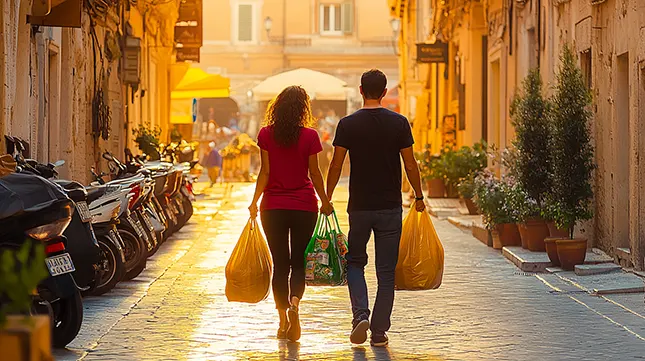
Italy offers a varied cost of living depending on where you choose to settle.
Major cities like Milan, Florence, and Rome are naturally more expensive, especially for rent and dining out.
However, smaller towns and rural regions like Abruzzo, Puglia, or Sicily are significantly cheaper and offer great value for money.
In general, groceries, public transport, and even utility bills tend to be lower than in the UK.
You can enjoy high-quality food for less, and the local produce available at weekly markets helps reduce costs while promoting a healthy Mediterranean diet.
Dining out is affordable too — you will find that even small trattorias offer excellent food at budget-friendly prices.
Italy’s cost of living can be a pleasant surprise, particularly for retirees or remote workers with a UK-based income.
For a detailed comparison, check Numbeo’s cost of living comparison data.
Renting or Buying Property in Italy
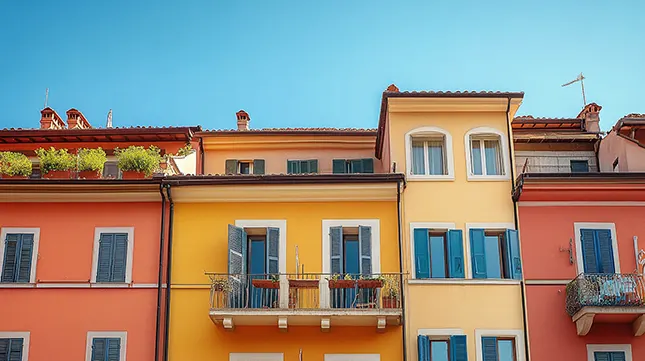
Hotels are out of the question for those intending to stay in the country for longer periods of time; a more permanent option is required.
Italy offers a wide range of housing options, from chic city apartments to rustic countryside villas.
Many newcomers choose to rent first while exploring their new area, which is a wise approach.
Rental agreements can be short- or long-term and usually require a deposit of two to three months’ rent.
Prices vary significantly by region, and rent is expected to be higher in major cities and tourist hotspots.
Take time to check out the Idealista website.
It lists thousands of rental properties and gives you a really good overview of where and what you can rent for your budget.
If you are looking to buy a property, the Italian property market is open to foreign businesses.
Whether it’s a renovation project in a hillside village or a modern flat in Florence, you will need a codice fiscale (tax code), notary assistance, and a good property lawyer.
Be aware of purchase taxes and notary fees, which are standard in Italy.
You can explore listings on Gate-away.com, a property portal aimed at foreign buyers.
Additionally, the Idealista website has also produced an easy-to-use guide with all you need to know about purchasing your dream Italian property.
Searching for Work in Italy

Italy isn’t just a dream destination for retirees, it’s also an exciting prospect for those looking to build a new career abroad.
Securing a job may be a top priority if you are planning a move from the UK.
While the Italian job market has its quirks, opportunities do exist, particularly in sectors like IT, engineering, healthcare, hospitality, logistics, and tourism.
As discussed in an earlier chapter, to work legally, you will need both a work visa (visto) and a residence permit (permesso di soggiorno).
The Italian government has ramped up its issuance of work permits for non-EU nationals, making this an opportune time to apply.
Fluency in Italian will significantly boost your job prospects, but some multinational companies operate in English, especially in larger cities.
For roles suited to expats, start your search on sites like https://www.justlanded.com and https://www.goabroad.com.
With the right skills and some perseverance, landing a job in Italy is entirely within reach.
Tackling Tax in Italy – What Every UK Expat Should Know
While sunshine and scenery await, tax is one part of Italian life you can’t escape.
Understanding how the local tax system works is essential if you are moving to Italy from the UK, whether you intend to find a job or you are retiring.
The first step? Secure your Codice Fiscale — the Italian equivalent of a National Insurance number.
You will need it to open a bank account, rent or buy property, sign up for healthcare, and yes, pay your taxes. The good news is it’s easy (and free) to obtain.
Simply visit your local Agenzia delle Entrate office (with your passport and completed form.
As a resident, you will be taxed on worldwide income.
Expect to pay income tax, social security, and property-related levies.
VAT stands at 22% for most items but drops to 4% on essentials like books and medicines.
Social security can be steep: employers contribute around 30%, and employees roughly 10%.
Always factor tax into your Italian budget!
For more assistance, visit the Experts for Expats website here.
Maximising Your Money – Getting the Best Exchange Rate

When relocating to Italy, exchanging currency may seem like a small detail, but it can have a huge financial impact, especially if you are selling a UK property to buy one in Italy.
With fluctuating exchange rates, even a slight shift can mean the difference of thousands of pounds. That’s why timing is everything.
Working with a trusted foreign exchange specialist can make all the difference. An FX company will offer you much more reasonable rates that you bank cannot match.
These companies track market trends in real time and can alert you when the rate is favourable.
Many provide forward contracts, allowing you to lock in a reasonable rate and confidently plan your finances.
There are limits to how much you can transfer, typically up to €1.2 million, and transfer fees may vary depending on the provider.
Start your research with services like Halo Financial, Wise, or CurrencyFair to get a tailored quote and expert support.
Italy’s Healthcare System Explained

Moving to a completely new country means that you have numerous things to deal with as soon as you can upon your arrival.
Ensuring you have adequate private health care cover from the get-go is imperative because it will take time before you have legal access to the public health care system.
Italy has a universal public healthcare system known as the Servizio Sanitario Nazionale (SSN), the local health authority.
This system offers excellent care at little or no cost to residents.
Once you register your residency in Italy, you are eligible to sign up with the SSN and access GP services, hospital care, and emergency treatment. Prescription medications are also subsidised.
To get started, you will need to register with your local ASL (health authority) and choose a general practitioner.
Alternatively, some expats opt for private health insurance, especially in the early stages before full SSN registration.
Private care ensures faster appointments and access to English-speaking doctors, particularly in larger cities.
If you are moving with children, knowing Italy’s paediatric care is top-notch is reassuring.
Bupa is a popular choice for UK expats, and they offer a wide range of cover.
For detailed information, the UK government provides guidance which you can access via their website.
Schooling and Education in Italy

If you are moving with children, education will be high on your list of priorities too.
Moving to a UK location with little ones is a concern, but moving to a different country is challenging.
All children between the ages of 6 and 16 must attend school in Italy, and education standards are generally good.
Italy offers a mix of public, private, and international schools.
Public schools are free and provide a high standard of education, but most classes are taught in Italian, which may initially be challenging for non-native speakers.
For a smoother transition, many expat families opt for international schools.
These offer curricula in English or other languages (such as the International Baccalaureate or British system). While they can be costly, they’re ideal for continuity and easier integration into global education systems.
Major cities like Rome, Milan, and Florence have several well-regarded international schools, such as St. George’s British International School.
Nursery and kindergarten education is also widely available, and early immersion can help younger children adapt quickly.
With the right support, most children thrive in Italy’s friendly and inclusive school environment.
How to Move Your Belongings to Italy
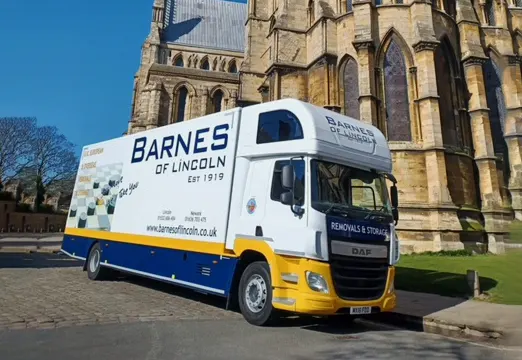
Barnes of Lincoln offers two main services for overseas removals: full load and part load.
If you are moving your entire home, a dedicated vehicle will transport your goods directly to your new address. This is the fastest option and allows for flexible scheduling.
Alternatively, our part-load service is ideal if you are only taking a portion of your household items. Your shipment shares space with others, making it a more cost-effective choice for smaller moves.
We offer professional packing services using high-quality materials, and our team ensures your items are securely transported from door to door.
Storage solutions are available in the UK and Italy.
If you need to stagger your move, just ask our office or speak to our surveyor during your house move survey.
We have also dealt with all necessary customs forms, item inventories, and international logistics.
Our team will be with you every step of the way, ensuring your move is efficient and stress-free, whether you are heading to Rome, Bologna or Bari.
Understanding Customs and Import Regulations
You must comply with Italian customs regulations when relocating to Italy and importing personal belongings.
The good news is, if you have lived outside of Italy for at least 12 months and your household items are used and owned for over six months, they can typically be imported without paying customs duties or VAT.
However, you will need to provide supporting documents, including a packing list, copy of your passport, proof of address, and your Italian residency documentation.
Restricted and prohibited items include firearms, certain plants, and large quantities of alcohol. Electrical goods must meet EU safety standards, and it’s always best to check specific regulations in advance.
Barnes of Lincoln will walk you through all required documentation and ensure your shipment is cleared smoothly through Italian customs, saving you time, stress, and unexpected delays.
For further information, take a look at the FIDI customs regulations for Italy. A downloadable guide is available.
Driving in Italy as a UK Citizen

If you plan to drive in Italy, the rules have changed post-Brexit.
You can use your UK licence for short visits, but if you plan to stay longer or become a resident, you must exchange your licence for an Italian one.
The process is straightforward if done within 12 months of becoming a resident; after that, you may need to take a driving test.
Italy drives on the right-hand side, and roads can be narrow, especially in rural villages.
Motorways are tolled, and city centres often have “ZTL” (limited traffic zones) with strict access rules. It’s also compulsory to carry a reflective jacket, a warning triangle, and headlamp converters in your car.
Resources like the AA’s guide to driving in Italy offer comprehensive advice on everything from fines to local driving etiquette.
Before moving, consider whether to ship your vehicle or buy locally. Barnes of Lincoln can assist with car transportation services if needed (just ask).
A quick word of caution: Italian drivers have a reputation for their bold and unpredictable driving style. Speed limits can feel more like suggestions, and lane discipline is often optional.
Until you have acclimatised to the local rhythm of the roads, it’s wise to take things slowly, stay alert, and resist the urge to react to impatient horn-honking.
Embrace a calm and cautious approach; your confidence will build in time.
Can I Bring My Pet to Italy?

You can bring your cat, dog, or ferret to Italy, provided you follow the correct pet travel rules.
Your pet must be microchipped, vaccinated against rabies, and accompanied by an Animal Health Certificate (AHC) issued within 10 days of travel.
The process can take a few weeks, so it’s vital to plan ahead.
Upon arrival, Italy does not require pets to be quarantined if all paperwork is in order. However, you may be asked to present your pet’s documents at the border.
Airlines and ferry companies also have individual rules, so double-check transport conditions before booking.
If you are unsure about the process, working with pet relocation specialists for added peace of mind is best. For detailed pet travel advice, visit https://www.gov.uk/taking-your-pet-abroad.
Do I Need to Speak Italian?
Although many Italians speak some English, especially in cities and tourist regions, learning Italian is a massive advantage for anyone moving to Italy long-term.
It improves your ability to integrate, helps with bureaucracy, and allows you to engage more fully with the local culture.
Basic Italian will help you at the post office, supermarket, or even just chatting with neighbours.
Free and paid apps like Duolingo and Babbel are great starting points, and local language schools often offer immersive courses for expats.
You might also consider evening classes or conversation exchanges.
Most official documents, healthcare interactions, and municipal services will be in Italian, so learning the basics is essential for daily life.
Not only will it make your transition smoother, but locals truly appreciate the effort and, it will open the door to authentic friendships and deeper cultural understanding.
From Sun-Soaked Shores to Snowy Peaks – Italy’s Climate Has It All

One of the most appealing parts of moving to Italy is undoubtedly the weather.
Many dream of swapping damp British drizzle for a Mediterranean climate. But Italy’s climate isn’t one-size-fits-all; it’s as diverse as the country itself.
If you are headed south to regions like Sicily, Sardinia, or Puglia, you can expect long hot summers and mild winters with temperatures rarely dropping to freezing.
This year-round warmth makes southern Italy especially popular with retirees and sunseekers.
Prefer a cooler contrast? Northern areas like the Italian Alps and Dolomites offer snowy winters, perfect for skiers and those craving a crisp mountain breeze.
Even with shifting global weather patterns, the north continues to deliver on winter charm.
Italy offers a setting to match, no matter your climate preference, sunny coastal life or alpine adventure.
Start Your Italian Move with Barnes of Lincoln
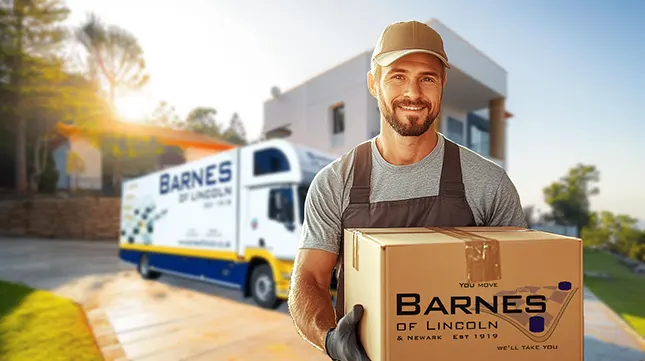
If you are planning a move to Italy, let Barnes of Lincoln take care of every detail.
With decades of experience in European removals, we specialise in seamless, stress-free relocations tailored to your exact needs.
From our expert packing and customs support to secure transport and storage solutions, our friendly team will ensure your belongings arrive safely and on time.
No matter where you are relocating from Rome, the Riviera, or to rural Tuscany, you can rely on us to make the journey smooth from start to finish.
Call us today 01522 254262 or visit www.barnesoflincoln.co.uk to request a free, no-obligation quote and start planning your move to Italy with total peace of mind.

